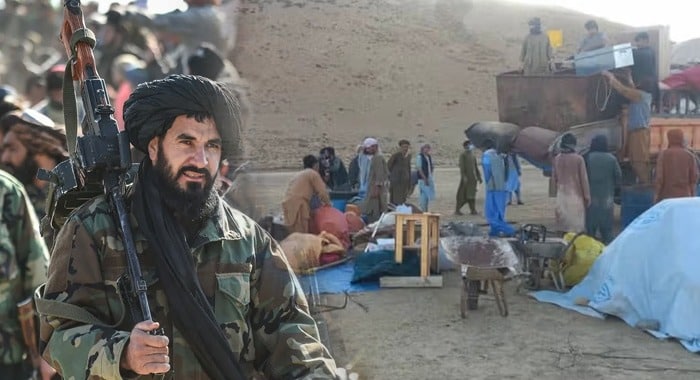While the Taliban is already facing public outrage over its ongoing harassment and arbitrary arrests of women in Kabul, another disturbing development has emerged from Ghor province, where Taliban forces have reportedly expelled over 100 families from their homes in Dawlatyar district in a violent, unilateral land grab.
According to local sources, the forced eviction took place in the Keshro valley, affecting families across six villages: Sang-e Shura, Darwaza, Dahane Ghori, Jireh Gak, Narmtab, and Hajiabad. Most of the displaced belong to the Taymani tribe, who have been locked in a long-running land dispute with the Khanzada (Sardar Khel) tribe. However, what has shocked observers is the Taliban’s heavy-handed involvement in a matter that should have been resolved through legal or tribal mediation, not through the barrel of a gun.
Residents say the Taliban deployed armed fighters over the past two days to expel families without any legal notice or fair process. A protest erupted on Friday as villagers resisted what they called a politically motivated and unjust operation.
The orders to clear the land reportedly came from Ahmad Shah Din Dost, the former Taliban governor of Ghor and current commander of the Taliban’s 205 Al-Badr Corps, who has long been accused of siding with the Sardar Khel tribe. Notably, one of Din Dost’s wives hails from that tribe, raising concerns over personal bias. Locals also claim Din Dost holds a deep grudge against the Taymanis for resisting his Taliban faction during the previous regime, resistance that allegedly led to heavy casualties among his ranks.
A ruling issued last year by Ghor’s Taliban-appointed religious council had recommended that the disputed land be divided equally between both tribes. However, Din Dost ignored this and unilaterally awarded the entire area to Sardar Khel families, triggering not only the current wave of evictions, but also further bloodshed in a region already scarred by tribal tensions.
Among those killed in the conflict since the Taliban’s return to power was Taymani elder Senator Ahmad Khan, reportedly gunned down in a targeted attack blamed on members of the rival tribe. Many in the region now fear the evictions could spark further violence if mediation is not restored.
Estimates suggest that around 600 families reside in the affected villages, many of whom have now been displaced with nowhere to go.
While this tribal crisis deepens in Ghor, the Taliban’s parallel crackdown in Kabul, particularly the harassment and detention of women, is fuelling broader criticism. Groups like the Afghanistan Freedom Front (AFF) have condemned both developments as proof of the Taliban’s repressive tactics and disregard for Afghan traditions, dignity, and human rights.
The AFF has warned that the Taliban’s so-called moral police and commanders involved in these abuses will now be legitimate targets of their guerrilla fighters. “Whether in the name of tribal revenge or false virtue, injustice will not go unanswered,” the group declared.
As the Taliban tightens its grip across Afghanistan, resistance to its abuses, both tribal and civil, appears to be intensifying, setting the stage for renewed conflict in the months ahead.





